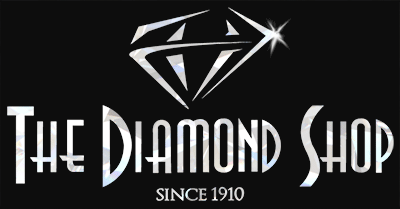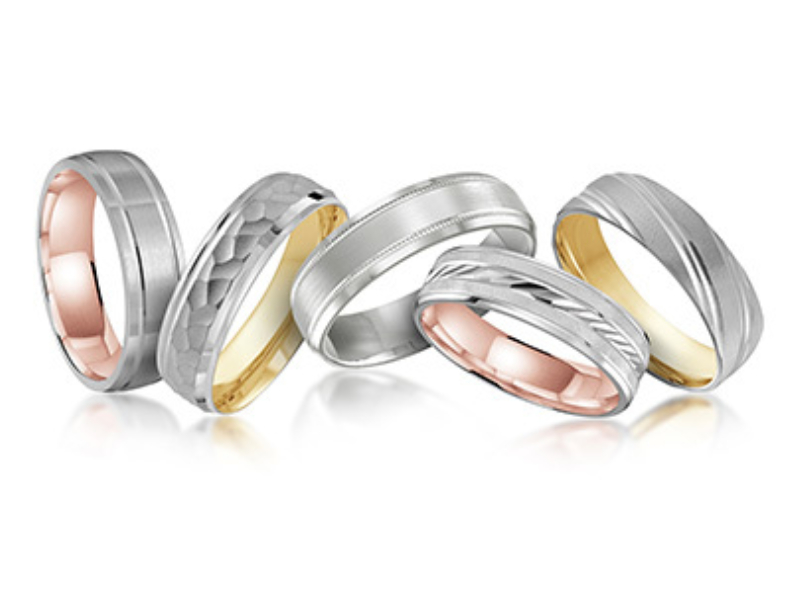Alternative metals in jewelry replicate fine materials such as gold and silver but are often less expensive. As a result, they continue to grow in popularity, especially in men’s wedding bands. However, alternative metals (ceramic, tungsten carbide, cobalt, titanium, and stainless steel) are also commonly found in necklaces and bracelets.
Two alternative metals frequently compared to each other in jewelry include tungsten and cobalt. They have similar properties yet crucial differences.
Tungsten Jewelry
Tungsten is the hardest and heaviest alternative metal. However, the tungsten in jewelry is rarely its purest form, as it is brittle – most often, tungsten mixes with carbon to create an alloy. Tungsten carbide gives jewelers the freedom to create unique, trendy styles.
History & Characteristics
The alternative metal’s name comes from the Swedish word for “heavy stone,” which accurately describes its most unique property – durability. Diamonds are the only substance stronger than tungsten carbide. Additionally, its scratch-resistant nature makes tungsten jewelry have little to no maintenance or upkeep.
Other characteristics of tungsten jewelry pieces include the following:
- Color: Tungsten rings, bracelets, and necklaces are commonly steel gray or rich black. Some pieces may have a gold plating that emphasizes flair.
- Weight: Thanks to its durability, tungsten is the heaviest alternative metal. Therefore, jewelry pieces made from tungsten boast a more expensive feel.
- Hypoallergenic: A prominent factor to consider when choosing jewelry is whether the metal will cause an allergic reaction to your skin. Tungsten wearers need not worry, as it’s a hypoallergenic substance.
Care
One contributing factor to tungsten’s popularity is its ease of maintenance. However, basic care is essential to its longevity. Store your tungsten jewelry in a lined box or soft pouch away from other pieces. Doing so prevents the tungsten from scratching other jewelry and vice versa. Further, you can maintain its shine by running it under warm water and cleansing it with a mild soap.
Cobalt Jewelry
Cobalt is another type of alternative metal used in jewelry. It’s also highly durable and has a natural white luster resembling gold and platinum. Therefore, it’s a popular option in men’s and women’s jewelry, taking the shape of bracelets, necklaces, and wedding rings.
Generally, cobalt is present in electronics, medical, and aerospace products. Its industrial properties also make it a durable yet affordable metal for jewelry. Additionally, it’s harder than precious metals such as gold, silver, or platinum. Cobalt is an excellent choice for those seeking beautiful pieces without significant upkeep.
Characteristics
Besides durability, cobalt jewelry boasts the following characteristics:
- Scratch-resistant: Since cobalt has several uses, it resists scratches and other potential cosmetic issues.
- Color: The most common color of cobalt jewelry is a bright white, but it can also be black or undergo oxidation to create a unique texture and finish.
- Weight: Cobalt lands in the middle compared to other precious and alternative metals. It’s similar in weight to platinum.
Care
Similar to tungsten, cobalt requires little to no maintenance. However, the same basic care applies. Ensure you store your cobalt jewelry away from other pieces in a soft casing. Use mild soap and warm water to cleanse your jewelry and keep its lustrous shine.
Tungsten vs. Cobalt: Pros & Cons
When deciding on your next jewelry purchase, it’s important to consider the pros and cons. However, what may be an advantage to some wearers could be a disadvantage to others – everyone has different styles and goals.
Tungsten Pros & Cons
The pros of tungsten carbide include the following:
- Used in various types of construction gear, flaunting the utmost durability
- Affordable and stylish
- Quality manufacturing process and materials
- Numerous available design options
The cons of tungsten carbide are as follows:
- It cannot be resized due to strength
- Not as crack-resistant due to the presence of carbon
- Not malleable, meaning it cannot feature intricate designs
Cobalt Pros & Cons
Cobalt, on the other hand, boasts the following advantages:
- Similar in color and shine to white gold
- Symbolizes affordable luxury
- Four times stronger than platinum
- Durable and won’t rust or tarnish
Its cons include the following:
- It may cause allergic reactions on the skin
- Limited in design due to its durability
- It can’t be resized
Browse Our Selection of Alternative Metals
If you’re seeking fashionable jewelry that won’t break the bank, alternative metals are an excellent choice. The Diamond Shop has a vast selection of wedding bands, bracelets, necklaces, and more featuring tungsten carbide and cobalt. Browse our selection of alternative metals online or visit us in Clayton today!

